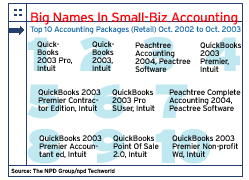Once More Into The Fray: Microsoft To Take On Intuit
Sources say the company is working on a project, code-named Magellan, that would take on a thus-far-unbeatable opponent: Intuit QuickBooks.
Details are sketchy. A spokeswoman would only confirm the code name and said Microsoft continues to investigate the best way to meet the needs of small-business customers.
But sources who were briefed have the impression that the product is in the works, and they expect it to debut next year.

This is not uncharted ground for Microsoft, which has had Intuit in its sights for a decade. It launched Microsoft Profit in 1993, in an unsuccessful attempt to wrest share from QuickBooks, and tried again in 2001 with a hosted offering called bCentral Finance Manager, which was gone within a year.
In 1995, Microsoft even tried to acquire Intuit for $1.5 billion. But a prolonged regulatory review scuttled that deal.
Partners say the current Microsoft Small Business Manager, at $995 per user, is too pricey for this market, which is by all accounts gigantic. The U.S. Small Business Administration estimates there are 23 million small businesses in this country employing more than 55 million people.
Orlando Ayala, senior vice president of Microsoft's Small and Midmarket Solutions and Partner Group, said the company will pony up $2 billion a year until the end of the decade on products for the SMB market.
But small-business accounting and personal finance, where Intuit also excels, have been likened to Microsoft's Vietnam. Microsoft Money hasn't made much of a dent vs. Quicken, and Microsoft launched and then nixed TaxSaver, which competed with Quicken's TurboTax. "They killed it after one year. They gave it away but still got only 5 percent market share," said one analyst who followed both companies.
Intuit appears unfazed by the rumblings even though Microsoft usually gets things right eventually. "That three-times rule is only true when they start off with a product and continue to refine it. This is a complete restart," said Steven Aldrich, general manager for QuickBooks.
"It's hard to tell if they'll get it right this time. They have the talent; it's a question of whether they have the will and understanding of the market," said Bob Scott, editor of Accounting Today, a New York-based newsletter.
Microsoft solution providers,many of whom use QuickBooks themselves,say there's room for a new low-price entry that would migrate easily to higher-end accounting programs.
People use QuickBooks because it's easy, "but to go from QuickBooks to Great Plains [as you grow] costs a lot and is difficult," said Frank Cullen, principal at Blackstone & Cullen, Atlanta.


%A0
The Money Game: Microsoft vs. Intuit
>>%A01982: Scott Cook launches Intuit.
>>%A01983: Intuit Quicken debuts.
>>%A01991: Microsoft launches Money vs. Quicken.>>%A01992: Intuit unveils QuickBooks.
>>%A01993: Microsoft Profit debuts to take on QuickBooks.
>>%A0Oct. 1994: Microsoft announces plans to acquire Intuit for $1.5 billion in stock.
>>%A0May 1995: Microsoft-Intuit deal falls apart in the face of prolonged regulatory scrutiny.
>>%A0April 2001: Microsoft launches bCentral Finance Manager, hosted accounting for small businesses.
>>%A0July 2001: Microsoft announces Small Business Manager accounting package, a scaled-down version of Great Plains
>>%A0Oct. 2001: Microsoft pulls plug on bCentral Finance Manager.
>>%A0July 2003: Microsoft announces Small Business Manager Version 7.5.
>>%A0Nov. 2003: Intuit QuickBooks 2004 updates Basic, Pro and Enterprise editions, and industry-specific versions for retail, professional services, manufacturing and wholesale businesses.
>>%A02004?: Microsoft 'Magellan' to take on QuickBooks.